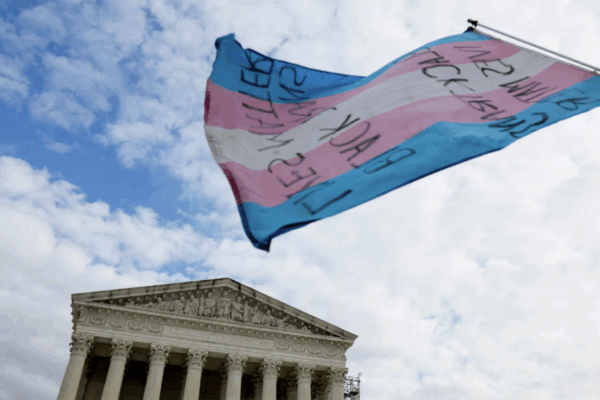The pseudonymous parents of two transgender children are suing the state of Kansas, alleging that the law prohibiting youth gender medicine in the state violates the Kansas Constitution's equal protection clause.
The lawsuit challenges the legality of Senate Bill 63, which prohibits health care providers from providing hormone therapy, puberty blockers or surgery for children with gender dysphoria.
It was the first bill that passed in the 2025 legislative session, despite an override by Kansas Gov. Laura Kelly.
The plaintiffs — identified as parent Lisa Loe and 13-year-old daughter Lily Loe, of Douglas County, and parent Rebecca Roe and 16-year-old son Ryan Roe, of Johnson County — say the state is discriminating against them on the basis of sex, violating their personal autonomy.
"For parents like Plaintiffs Rebecca Roe and Lisa Loe, SB 63 impermissibly infringes on the fundamental right to the care, custody, and control of their children by displacing their medical decision-making authority with a government mandate, even when they, their adolescent children, and medical providers are all aligned," the lawsuit says.
The American Civil Liberties Union of Kansas filed the lawsuit in Douglas County Court.
"Our clients and every Kansan should have the freedom to make their own private medical decisions and consult with their doctors without the intrusion of Kansas politicians," said D.C. Hiegert, civil liberties legal fellow for the ACLU of Kansas. "SB 63 is a particularly harmful example of politicians' overreach and their efforts to target, politicize, and control the healthcare of already vulnerable Kansas families."
Kansas Attorney General Kris Kobach responded to the lawsuit, saying he looks forward to defending the law in court.
"Once again, the ACLU is attempting to twist the meaning of the Kansas Constitution into something unrecognizable. The Kansas Legislature was well within its authority when it acted to protect Kansas children from these harmful surgeries," Kobach said in a news release.
Get the Afternoon Headlines newsletter in your inbox.
Get the latest headlines you may have missed
Delivery: Weekdays
Your Email
The U.S. Supreme Court is currently reviewing a Tennessee law that bans doctors from practicing youth gender medicine, and a decision is expected sometime this summer.
The Loes and Roes
The lawsuit alleges that Lily Loe expressed a female gender identity from an early age, opting for girls clothes, toys and games. She started calling herself a girl around the time she started elementary school.
"When Lily was about seven years old, she asked Lisa if, once she got to heaven, she could be a girl. Even though Lily’s behavior challenged Lisa’s faith, Lisa realized she needed to find new ways to support her child," the lawsuit says.
Lily visited youth gender specialists at Children's Mercy Hospital, who eventually diagnosed her with gender dysphoria prior to puberty. Last year, when Lily was 12, she was prescribed puberty blockers.
After the law went into effect, Children's Mercy declined to continue providing puberty blockers, and the Loes have since sought out-of-state care.
Ryan Roe similarly expressed a preference for a male gender identity at a young age, and by fourth grade insisted on boys clothing and hair styles.
The Roes moved to Kansas in 2022 in response to anti-transgender legislation in their home state of Texas, according to the lawsuit. In 2023, when Ryan was in eighth grade, he started using masculine pronouns.
Sponsored By DePaul University
Welcome Home, Blue Demon
Learn More
"Ryan had already started going through puberty, and could not stand the feminine aspects of his body. Even though Ryan could dress and groom in a masculine fashion, it was clear to his parents that wasn’t sufficient to alleviate the distress he felt around his body," the lawsuit says.
A therapist diagnosed Ryan with gender dysphoria in 2022, and the next year when he was 14 he was prescribed testosterone. After Kansas passed its law prohibiting youth gender medicine, the family looked for out-of-state options and considered moving to another state.
Bill's long path to becoming law
Kansas attempted to ban cross-sex hormones and puberty blockers for transgender youth before the 2025 law, but it failed to achieve the two-thirds majority needed to overturn a veto. After Kansas Republicans expanded their supermajority in the 2024 elections, their were fewer barriers to passing the law.
A 2023 bill failed to get the needed support to overturn a veto. In 2024, with some amendments, it picked up previously skeptical lawmakers, namely Sen. Brenda Dietrich, R-Topeka, who was concerned about abruptly stopping treatment.
In 2024, a bill included a weaning off period for children taking cross-sex hormones, but Rep. Jesse Borjon, R-Topeka, flipped his vote on that bill out of concern it was too restrictive for mental and behavioral health care.
In 2025, only one Republican split from the party to oppose the bill.

